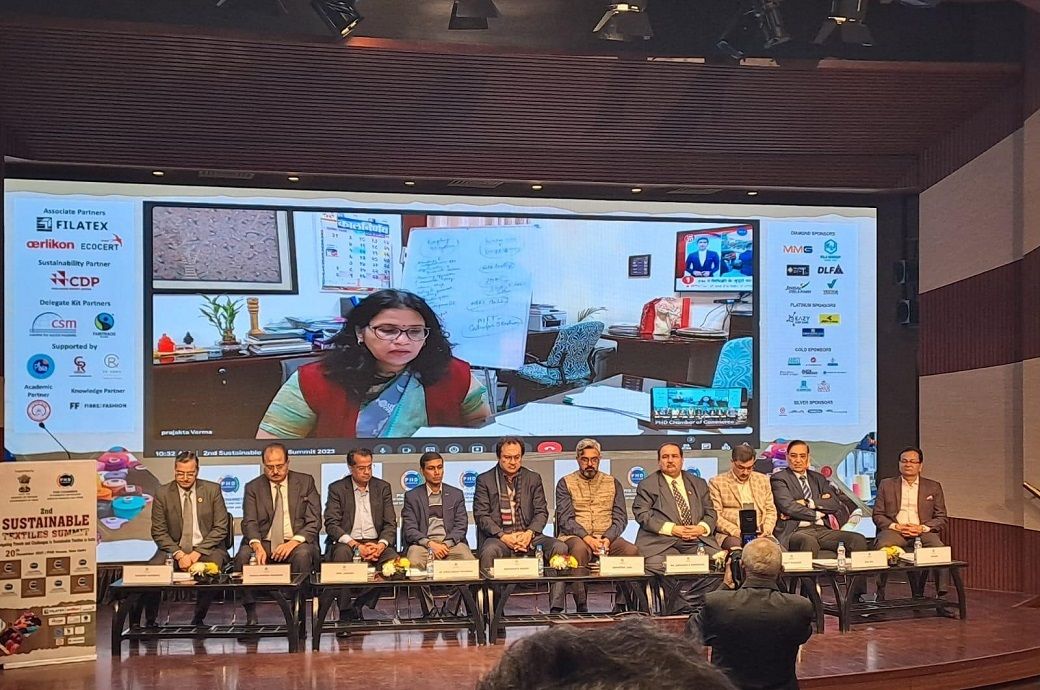
As the knowledge partner of the event, Fibre2Fashion launched a knowledge paper titled ‘Organic Shift in Value Chain: Exploring Sustainable Textiles for a Greener Future.’
During the inaugural session on Policies and Regulations, Challenges & Opportunities for Textile Sustainability, and the Way Forward, Verma noted that sustainable textiles have become a critical issue for the entire value chain. She acknowledged that the textile ecosystem is diligently working towards this goal, with several start-ups developing high-quality circular products. Verma also highlighted the importance of traceability in sustainability, mentioning the government's recent launch of a traceability project in Kasturi cotton. According to ministry officials, the government is ready to support the industry through policy interventions and budget allocations. She encouraged the industry to prepare a roadmap for sustainable textiles.
Madhu Sudhan Bhageria, chairman of the PHDCCI Textiles Committee and chairman and managing director of Filatex India Ltd, provided an overview and introduction of the summit. He observed that today's consumers are increasingly concerned about the environment, and several brands are taking this matter seriously. He emphasised the need to spread awareness in the textile industry. Anil Jadhav, regional director of South Asia & the Middle East at Ecocert, stated at the summit that certification is a crucial part of sustainable textiles, with environmental and social responsibility becoming increasingly important in the industry.
Professor Abhijit Majumdar from the Indian Institute of Technology, Delhi, expressed concern over the rapid increase in textile production and frequent discarding by consumers, leading to escalating textile waste and environmental issues. He pointed out that circularity and waste management are vital aspects of sustainability and suggested that blockchain technology could provide traceability throughout the textile value chain. He stressed the need for optimising processes in the textile value chain to reduce environmental footprints.
Debabrata Ghosh, vice president and sales director at Oerlikon Textile India Private Limited, proposed that integrating textile processes could reduce environmental impacts and production costs. He noted that various processes such as spinning, weaving, dyeing, printing, and garmenting are currently conducted at different locations, leading to high transportation costs and time.
Abhishek Jani, CEO of Fairtrade India, emphasised the importance of collective engagement to achieve sustainable textile goals, highlighting the significant use of water and chemicals throughout the textile value chain.
Dr. Srikanta K Panigrahi, director general of the Indian Institute of Sustainable Development (IISD) and a sustainability thought leader, cautioned the industry, noting that sustainability has become a focal point in European and other developed markets. He mentioned that buyers are willing to pay more for certified garments and warned that Indian industry must adapt quickly to avoid technical trade barriers. He announced that the Bureau of Indian Standards (BIS) would introduce standards in this direction.
Vinit Kumar, CEO of the Khadi and Village Industries Commission (KVIC), pointed out that the production process for Khadi clothes is already sustainable, consuming five times less water and requiring no electricity. He emphasised the importance of certification and labelling in enhancing the credibility of sustainable clothes.
Various experts and industry captain have discussed on Mapping the Landscape of Sustainable Textiles in India and Textile Sustainability, Textile Recycling, Challenges & Opportunities followed by by Panel Discussion on Carbon Disclosures and Emissions Reduction in other sessions. Prof. Bipin Kumar, Department of Textile and Fibre Engineering, Indian Institute of Technology, Delhi stresses to increased penetration of circularity. Ms Manisha Choudhary, National Coordinator, Partnership for Action on Green Economy (PAGE) India, UN Environment Programme said that it is very important to pass knowledge in compact manner to fragile small and medium sized textile industries. Anupam Prasad, Head of Office-India, Sedex told that Sedex is a mapping platform for sustainability of textile.
Various experts and industry leaders discussed Mapping the Landscape of Sustainable Textiles in India, Textile Sustainability, Textile Recycling, Challenges & Opportunities, followed by a Panel Discussion on Carbon Disclosures and Emissions Reduction. Prof Bipin Kumar from the Department of Textile and Fibre Engineering, Indian Institute of Technology, Delhi, stressed the need to increase the penetration of circularity.
Manisha Choudhary, National Coordinator of the Partnership for Action on Green Economy (PAGE) India, UN Environment Programme, highlighted the importance of conveying knowledge compactly to small and medium-sized textile industries.
Anupam Prasad, Head of Office-India at Sedex, informed that Sedex is a mapping platform for the sustainability of textiles.
R K Vij, co-chair of the PHDCCI Textile Committee and secretary-general of the PTA Users Association, urged the government to streamline policies related to the textile industry. He pointed out that current policies have not prevented the influx of imported fabrics into the industry.
Jaswant Singh, senior manager – Sustainability Operations at EKI Energy Services Ltd, and Surya Prakash Valluri, CSO at Grasim Ltd, emphasised the need for fair distribution of margins. They noted that retailers and brands enjoy an average margin of 35-40 per cent, while upstream value chain industries manage with single-digit margins, yet bear the primary responsibility for sustainability.
Fibre2Fashion News Desk (KUL)